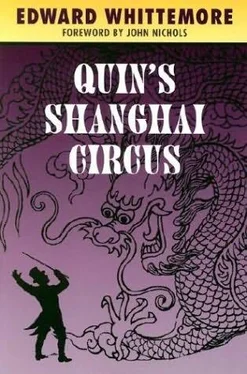Edward Whittemore - Quin’s Shanghai Circus
Здесь есть возможность читать онлайн «Edward Whittemore - Quin’s Shanghai Circus» весь текст электронной книги совершенно бесплатно (целиком полную версию без сокращений). В некоторых случаях можно слушать аудио, скачать через торрент в формате fb2 и присутствует краткое содержание. Жанр: Фэнтези, на английском языке. Описание произведения, (предисловие) а так же отзывы посетителей доступны на портале библиотеки ЛибКат.
- Название:Quin’s Shanghai Circus
- Автор:
- Жанр:
- Год:неизвестен
- ISBN:нет данных
- Рейтинг книги:3 / 5. Голосов: 1
-
Избранное:Добавить в избранное
- Отзывы:
-
Ваша оценка:
- 60
- 1
- 2
- 3
- 4
- 5
Quin’s Shanghai Circus: краткое содержание, описание и аннотация
Предлагаем к чтению аннотацию, описание, краткое содержание или предисловие (зависит от того, что написал сам автор книги «Quin’s Shanghai Circus»). Если вы не нашли необходимую информацию о книге — напишите в комментариях, мы постараемся отыскать её.
Quin’s Shanghai Circus — читать онлайн бесплатно полную книгу (весь текст) целиком
Ниже представлен текст книги, разбитый по страницам. Система сохранения места последней прочитанной страницы, позволяет с удобством читать онлайн бесплатно книгу «Quin’s Shanghai Circus», без необходимости каждый раз заново искать на чём Вы остановились. Поставьте закладку, и сможете в любой момент перейти на страницу, на которой закончили чтение.
Интервал:
Закладка:
In front of the array of food two small figures in ice were set up, the one a man in frock coat with whip and megaphone, the other a boy with a dented shoulder.
At the foot of the hill the procession of limousines was at last coming to an end, and although it was cold for September the two ice figures were already beginning to melt. Kikuchi-Lotmann gazed at the sun sinking out of sight.
A little of this, he said, and a little of that. Or put another way, we sit in the East and watch the sun go down in the West. But if we were to reverse ourselves?
The ice figures were pools of water. Kikuchi-Lotmann’s head wagged. He blew the water and sprayed it over the grass, fogging his glasses. A sad smile came to his face as he spread a slice of fish on a bagel.
Mixed buffet, he said in the half-light. Help yourself.
The elderly Emperor sat thin and erect in his ornate Victorian parlor, one hand gripping each horsehair arm of his throne. His black habit hung loosely around him, the cloth worn, the celluloid collar unstudded and awry. On the table in front of him stood a bottle of Irish whiskey.
Uncertain weather, he whispered. I’ve always enjoyed the latter part of September here. The air is uneasy as if hiding some secret, yet we all know typhoons are in the natural order of things. Is that bottle what it appears to be?
Yes, said Quin.
Father Lamereaux sighed.
It’s been a long time since I’ve tasted that, nearly a quarter of a century. When I first came to Japan I had my cats and the Legion and the flowers of Tokyo, and there were the temples in the lovely hills above Kamakura with their gongs and rituals and the periods set aside for contemplation. The Legion met at that long table behind you and we had discussions on No plays after the closing prayer and the passing of the secret-bag. But then in the 1930s they took those ugly cannons they captured from the Russians in 1905 and placed them around the shrines. How did that bottle get there?
It’s a present for you, said Quin. I’ll be leaving soon and we might not meet again. I thought we might have a drink together.
No, we probably won’t meet again.
I remembered that Geraty said you and he had a glass of Irish whiskey together the last time he saw you, when he left for China before the war.
Did he say that? Perhaps we did, I’ve forgotten. After that I lost the cats and the legionaries. The flowers of Tokyo weren’t so beautiful during the war when the whole city was burning down. Since then I’ve been a strict vegetarian, honey and eggs excepted. Rice has a peculiar effect on the bowels of the Japanese, which is one reason they prefer the out-of-doors. I prefer it myself, especially my own garden, but I can’t do it when it’s raining.
Can I pour you a drink?
I think so. I think I just might have one today because there’s going to be a typhoon and because I lost everything a quarter of a century ago, too long a time to have nothing. I believe we should emulate the Virgin, a human soul must not resign itself to imperfection. The Emperors of Japan were great men until military dictators forced them into retirement in the thirteenth century. The Emperor was simply thrown out in the streets and told to barter pickles and bugger his autograph for rice. Then in the 1920s I went to study in Kamakura. Once on a spring afternoon there I heard the music that had tempted the sun goddess from her cave, exquisite music played on a koto a thousand years old. Elijah and the sun goddess played it for me as I nodded with the flowers, as the shoemaker’s son sat at his shoemaker’s bench and sang a dragon’s epic so strange and sanctifying it surely must have been a gift from the distant Lapps. Did you know Elijah or the shoemaker’s son? Did you know Henry Pu Yi? He was a very naughty man and his mythical country never really existed. But for all that, he was still the last emperor I had an opportunity to talk to. I suppose I’ve already mentioned the Peram and their necronym system, Father of Uncle Dead and the rest. Even among simple tribesmen relationships can be quite complex. Quite complex when we look into it.
The old priest unbuttoned his coat the wrong way. He took the glass of whiskey and studied it. The windows were rattling violently. Gusts of air shot across the room. Although it was only early afternoon the sky was already dark. The whole house seemed to be swaying in the wind.
Father Lamereaux drank. He raised the glass again and emptied it. His hands relaxed and he smiled gently. All at once his eyes sparkled.
I think that’s better, he said. I think that’s much better.
Father, I wonder if you could tell me why you named the child Gobi? I assume that was your doing.
Yes, it was, although I haven’t thought about it in many years. Sometimes we forget certain things when we go into retirement. I believe I’d like another, please.
Quin refilled the glass.
Not in years. Didn’t remember it at all, but now I do.
How did you happen to choose the name?
First of all because the infant was brought to me nameless. Hasn’t it always been so? The Emperor arrives in the world nameless, yet centuries later we know the era by his name and no other. It’s an old custom and an important one. No other name will do.
And what did the name Gobi mean?
Ultimately who is to say? We know it was the name of an espionage network that once existed here and in China. We know that Adzhar suggested it that afternoon we had the picnic on the beach, he and I and your parents, the time we wore gas masks. We know your father said our group should have a name and Adzhar said it should be Gobi . We know the four of us laughed and that was that.
And who was Adzhar?
I’m not sure. Marco Polo perhaps? I’ll have another, please.
Quin poured. Father Lamereaux smiled.
Do you know I’m beginning to think I might come out of retirement? This would be an appropriate day to do it, during a typhoon.
And Adzhar?
Yes indeed, a very dear friend. He and I and Lotmann were inseparable in those days. Have you ever heard of him? Do you know anything at all about this unique little man who had such a miraculous way with languages?
No I don’t, Father. Nothing at all.
Well, then you should. It would be folly to visit the East and not know something about the man who spent his whole life getting here. Lotmann never drank, but Adzhar certainly did. Well, I think I’ll just have one more before I go on. One or possibly two in memory of both of them.
Quin filled the Jesuit’s glass. Father Lamereaux sipped. He smiled gently and began to whisper.
He was born the son of a shoemaker in Gori, a town in Georgia, a few years before Alexander II freed the serfs. He was sent to a seminary in Tiflis to study for the Orthodox priesthood but was soon expelled as an anarchist and a nihilist. He was a restless man, Adzhar or whatever his real name was, once he hinted it might be Dzugashvili. In any case, when he was expelled from the seminary he went to St. Petersburg to study chemistry. A few years later, in the spring of 1880, he fell in love with a beautiful woman.
Sophia was a member of the nobility, the daughter of the governor of St. Petersburg. When she was a baby her autocratic father cast off his wife and sent her to Switzerland so that he would be better able to carry on his many affairs with women.
Sophia grew up not knowing she had a mother. When she discovered the truth about her father she decided to kill the Czar.
She visited her mother in Geneva and there contacted the Russian nihilist exiles who were also plotting to assassinate the Czar. With her beauty and her position she was a valuable asset to them. She moved in court circles, and her hatred for her father was so great she was more than willing to use her body to obtain information on the Czar’s security arrangements. It wasn’t long before the Czar’s courtiers, in bed in her arms, had told her everything the plotters needed to know.
Читать дальшеИнтервал:
Закладка:
Похожие книги на «Quin’s Shanghai Circus»
Представляем Вашему вниманию похожие книги на «Quin’s Shanghai Circus» списком для выбора. Мы отобрали схожую по названию и смыслу литературу в надежде предоставить читателям больше вариантов отыскать новые, интересные, ещё непрочитанные произведения.
Обсуждение, отзывы о книге «Quin’s Shanghai Circus» и просто собственные мнения читателей. Оставьте ваши комментарии, напишите, что Вы думаете о произведении, его смысле или главных героях. Укажите что конкретно понравилось, а что нет, и почему Вы так считаете.












